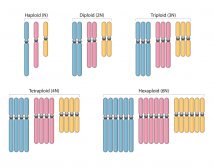third-order kinetics
(Science: pharmacology) A term describing the reaction rate of a chemical reaction in which the rate is proportional to the product of the concentrations (in moles) of three of the reactants, the product of the molar concentration of one reactant and the square of the molar concentration of another reactant, or the cube of the molar concentration of one of the reactants.
Such a reaction might have an equation like rate = k[A][B][C] or rate = [A][B]2 or rate = where k is the reaction rate constant, [A] is the concentration of reactant A, [B] is the concentration of reactant B, and [C] is the concentration of reactant C.
Dictionary > Third-order kinetics
You will also like...

Polyploidy
Humans are diploid creatures. This means that for every chromosome in the body, there is another one to match it. Howeve..

Neurology of Illusions
Illusions are the perceptions and sensory data obtained from situations in which human error prevents us from seeing the..

Running Water Freshwater Community Factors
This tutorial noted some of the physical and chemical factors that provide the framework of a running water community in..

Roots
This study guide tackles plant roots in greater detail. It delves into the development of plant roots, the root structur..

Examples of Natural Selection
Darwin's Finches are an example of natural selection in action. They are an excellent example of the way species' gene p..

Chemical Composition of the Body
The body is comprised of different elements with hydrogen, oxygen, carbon, and nitrogen as the major four. This tutorial..

